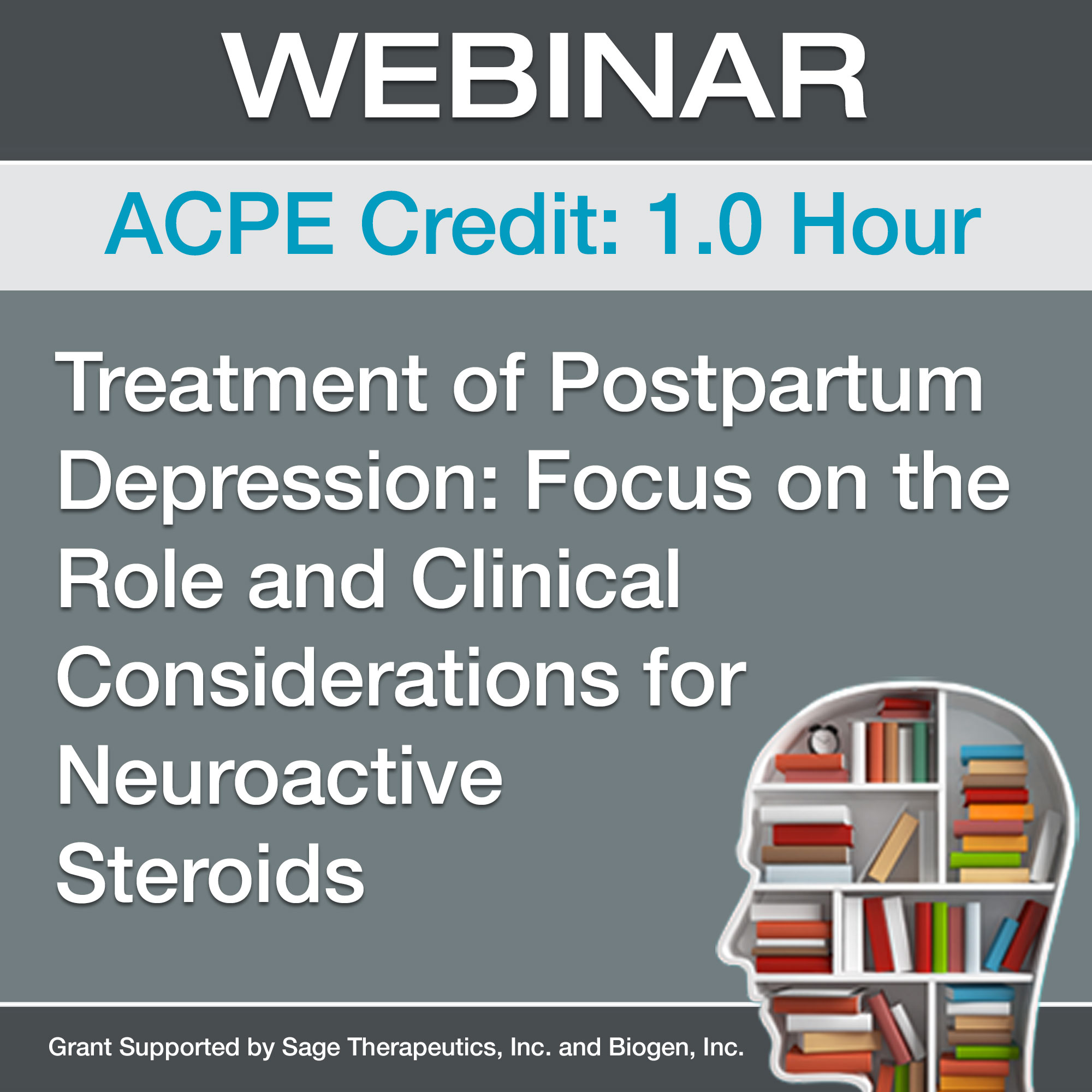Course Description
 This session is a free, grant-supported continuing education webinar.
This session is a free, grant-supported continuing education webinar.
Postpartum depression (PPD) is one of the most common complications during pregnancy and a leading cause of postpartum mortality in the first year of life. While screening and diagnosis of PPD has improved in recent years, there is still an access and treatment gap for patients that needs to be addressed. Overall, there is an unmet need for fast-acting, effective pharmacotherapies for PPD to minimize the potential consequences in treatment delays. The neuroactive steroids (NAS), brexanolone and zuranolone, have a unique mechanism of action and offer rapid onset with a short treatment course. Though, where these medications fit into current practice and when/how they should be used may pose a challenge for clinicians. This program will help ensure psychiatric pharmacists and other health care professionals involved in PPD management understand the potential benefits and drawbacks to available treatments – including newer NAS medications – while considering efficacy and minimizing patient exposure to adverse events.
Note: Brexanolone was discontinued in December 2024. Information related to brexanolone remains in the presentation for historical purposes and for sites that are using up any remaining supply.
This free grant-supported webinar was presented as part of the 2024 Summit.
Go to the 2024 Summit schedule
Post-session follow-up question and answer:
- Question from attendee: Do the CNS side effects associated with the use of neuroactive steroids generally resolve with drug discontinuation or may they persist?
- Answer from speaker: No research on this, but in my clinical experience the side effects do NOT persist once the drug is discontinued.
Learning Objectives
- Explain how neuroactive steroids differ from traditional treatment approaches to postpartum depression and may address gaps in care.
- Identify potential risks and benefits of using neuroactive steroids for treatment of postpartum depression based on available data and clinical experience.
- Discuss where neuroactive steroids fit into clinical practice and the treatment landscape of postpartum depression.
Target Audience
If you are a pharmacist, nurse practitioner, or other health care professional involved in the comprehensive medication management of individuals living with mental health and/or substance use disorders, we invite you to participate in this online course.
Faculty

View biographical information
Lauren M. Osborne, MD
Associate Professor of Obstetrics & Gynecology, Associate Professor of Psychiatry, Vice Chair for Clinical Research in Obstetrics & Gynecology; Weill Cornell Medicine
Lauren M. Osborne, MD, graduated from Weill Cornell Medical College and received her psychiatric training at Columbia University/New York State Psychiatric Institute. She completed both clinical and research fellowships in women's mental health, and is an expert on the diagnosis and treatment of mood and anxiety disorders during pregnancy, the postpartum, the premenstrual period, and perimenopause. Dr. Osborne is an Associate Professor of OB-GYN and of Psychiatry and serves as the Vice Chair of Clinical Research in the Department of Obstetrics & Gynecology at Weill Cornell Medicine. Her research on perinatal mental illness focuses on models of care and on biological mechanisms and biomarkers, with a focus on neurosteroids and the immune system, and she runs the PIPPI Lab – Psychoneuroimmunology in Pregnancy and Postpartum – at Weill Cornell. Dr. Osborne’s clinical work consists of collaborative care for perinatal mental health within OB/GYN. She is also the chair of the Education Committee for Marcé of North America; founder and chair of the National Curriculum in Reproductive Psychiatry, a free web-based standardized curriculum; and an editor of The APA Textbook of Women’s Reproductive Mental Health. Her work has been supported by the Brain and Behavior Foundation, the Doris Duke Foundation, the American Board of Psychiatry and Neurology, the NIMH, and the NICHD.
Course Requirements
To receive ACPE credit for this session, you must:
- Register for this course.
- Review the full content of the activity and reflect upon its teachings.
- Complete the evaluation at the end of the activity.
- Provide the necessary details in your profile to ensure correct reporting by AAPP to CPE Monitor.
Continuing Education Credit and Disclosures
Activity Dates: 10/11/2024 - 10/11/2025
ACPE Contact Hours: 1
ACPE Number: 0284-0000-24-067-H01-P (Knowledge)
Nursing Credit Reminder: Note that ACPE credit is accepted for ANCC Certification Renewal and AANPCB advanced practice provider content. For specific questions related to your organization's acceptance of ACPE continuing education units, please contact your organization directly.
 The American Association of Psychiatric Pharmacists is accredited by the Accreditation Council for Pharmacy Education as a provider of continuing pharmacy education.
The American Association of Psychiatric Pharmacists is accredited by the Accreditation Council for Pharmacy Education as a provider of continuing pharmacy education.
AAPP owns the copyright, is licensed or has received permissions for use of, or is otherwise permitted to use copyrighted materials within any CPE activity. Authors and speakers are required to obtain necessary copyright permissions for content in CPE activities. AAPP complies with copyright laws and regulations.
View disclaimer and disclosure of off-label use
Off-Label Use: This educational activity may contain discussion of published and/or investigational uses of agents that are not indicated by the FDA (see faculty information). The opinions expressed in the educational activity do not necessarily represent the views of AAPP and any educational partners. Please refer to the official prescribing information for each product for discussion of approved indications, contraindications, and warnings.
Disclaimer: Participants have an implied responsibility to use the newly acquired information to enhance patient outcomes and their own professional development. Any procedures, medications, or other courses of diagnosis or treatment discussed or suggested in this activity should not be used by clinicians without evaluation of their patient’s conditions and possible contraindications on dangers in use, review of any applicable manufacturer’s product information, and comparison with recommendations of other authorities. Please refer to the official prescribing information for each product for discussion of approved indications, contraindications, and warnings.
View fair balance and integrity statement
It is the policy of AAPP to ensure independence, balance, objectivity, scientific rigor, and integrity in continuing education activities. Those involved in the development of this continuing education activity have made all reasonable efforts to ensure that information contained herein is accurate in accordance with the latest available scientific knowledge at the time of accreditation of this continuing education activity. Information regarding drugs (e.g., their administration, dosages, contraindications, adverse reactions, interactions, special warnings, and precautions) and drug delivery systems is subject to change, however, and the reader is advised to check the manufacturer’s package insert for information concerning recommended dosage and potential problems or cautions prior to dispensing or administering the drug or using the drug delivery systems.
Fair balance is achieved through ongoing and thorough review of all materials produced by faculty, and all educational and advertising materials produced by supporting organizations, prior to educational offerings. Approval of credit for this continuing education activity does not imply endorsement by AAPP for any product or manufacturer identified.
